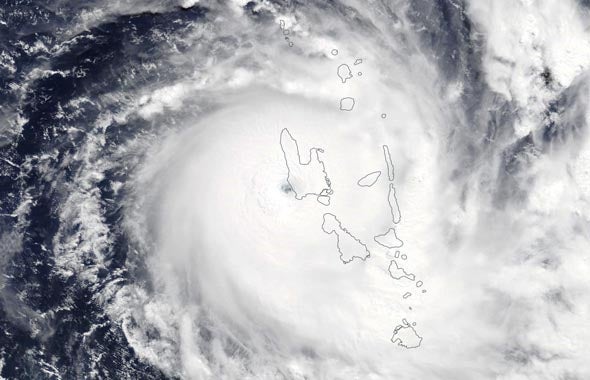Statement by H.E. Georges Rebelo Pinto Chikoti, Secretary General of the OACPS on the impact of Tropical Cyclone Harold in the Pacific region
 Tropical Cyclone Harold started on 1 April 2020 as a tropical storm in the Pacific region and rapidly strengthened on 6 April 2020 to a Category 5 cyclone. The cyclone, with highest winds of 220km/hr, struck the Solomon Islands, Vanuatu, Fiji and Tonga and caused significant damage. The cyclone is currently active and thus far, there are reports of approximately 27 deaths; maritime rescue accidents and fatalities; displacement of thousands of households; substantial losses due to heavy rainfall, storm surges, fallen trees and branchesand severely damaged public and private infrastructure. Heavy rainfall also threatens the contamination of water supplies and destroyed crops, particularly in low-lying plains. These floods will negatively impact the short-and-medium term food security of the affected islands.
Tropical Cyclone Harold started on 1 April 2020 as a tropical storm in the Pacific region and rapidly strengthened on 6 April 2020 to a Category 5 cyclone. The cyclone, with highest winds of 220km/hr, struck the Solomon Islands, Vanuatu, Fiji and Tonga and caused significant damage. The cyclone is currently active and thus far, there are reports of approximately 27 deaths; maritime rescue accidents and fatalities; displacement of thousands of households; substantial losses due to heavy rainfall, storm surges, fallen trees and branchesand severely damaged public and private infrastructure. Heavy rainfall also threatens the contamination of water supplies and destroyed crops, particularly in low-lying plains. These floods will negatively impact the short-and-medium term food security of the affected islands.
The Secretariat of the Organisation of African, Caribbean and Pacific States (OACPS) is collaborating with the European Commission, Secretariat of the Pacific Community (SPC) and international partners such as the United Nations Development Programme (UNDP) and the Global Facility for Disaster Reduction and Recovery (GFDRR) of the World Bank to ensure the delivery of emergency supplies, medicines and relief necessities, including those specifically required by women and children.
The OACPS Secretariat is launching an appeal for solidarity from the European Commission (EC) and the international community to provide financial and technical assistance to help address the immediate short-term needs of those affected by the cyclone, as well as the longer-term task of recovery and reconstruction.
On behalf of the OACPS, I would like to express my profound regrets for the displacement, loss of lives and livelihoods; and convey my deep condolences to all affected by Tropical Cyclone Harold.
The OACPS further reiterates its resolve to assist the affected Governments and the people of the Pacific region through the effective utilisation of Natural Disaster Risk Management resources from the 11th EDF intra-ACP development cooperation envelope.
